Gold, and the Future Way Through Economic Collapse
Economics / Great Depression II Sep 07, 2010 - 03:39 AM GMTBy: Darryl_R_Schoon
 When younger, Alan Greenspan wondered if he could have prevented the Great Depression had he been Fed chairman during the 1920s. Fate, however, was to give Greenspan a far different future than he expected; instead of preventing a depression, he would cause one.
When younger, Alan Greenspan wondered if he could have prevented the Great Depression had he been Fed chairman during the 1920s. Fate, however, was to give Greenspan a far different future than he expected; instead of preventing a depression, he would cause one.
After the scare of the 1970s, central bankers, i.e. Greenspan et. al., focused on containing inflation and came to believe they had successfully done so, not realizing that monetary expansion had instead morphed into asset bubbles, e.g. stocks, property, and bonds, not general price inflation as in the past.
Deluded by his apparent success, as chairman of the Federal Reserve Greenspan provided Wall Street with ever-increasing amounts of credit while unleashing market forces that would someday bring down the markets themselves (not until his Fed tenure ended would most understand what Greenspan had set in motion).
Receiving an honorary knighthood from the Queen of England in 2002 for his apparent ability to create growth without inflation, Greenspan enjoyed the adulation of his increasingly wealthy followers who had not yet experienced the end-result of his policies, to wit the catastrophic collapse of global markets on an unprecedented scale.
Greenspan’s loose credit policies were to be responsible for the collapse of the two largest bubbles in history, the US dot.com and the US property bubbles. Their sequential destruction within a decade would unleash 20 years of Greenspan’s unprecedented compounding debt upon an unsuspecting world—a vast deleveraging that would bring down the global economy and push it towards the edge of another Great Depression.
If fortune was unkind to Alan Greenspan, it would be no less so to his successor, Ben Bernanke. Bernanke would be the chairman of the Federal Reserve when Greenspan’s massive property bubble collapsed in 2007, one year after Greenspan resigned.
But Ben Bernanke, like Greenspan, also had a date with destiny that was to be far different than expected; for just as Greenspan wondered if he could have prevented the Great Depression, Bernanke was certain that he, Ben Bernanke, if appointed chairman of the Fed, possessed the requisite knowledge to reverse a depression should one occur.
And just as fortune had presented Greenspan the opportunity to test himself and his theories in real time, Ben Bernanke was to be afforded the very same opportunity. The outcomes would not be dissimilar.
Pity should be reserved only for those deserving
BERNANKE’S TURN AT THE WHEEL OF FORTUNE
Bernanke believed that University of Chicago economist, Milton Friedman, had discovered the antidote for deflationary depressions. Noting that the money supply had contracted between 1930 and 1933, Friedman theorized that if the Fed had then engaged in sufficient monetary expansion, the depression would have been averted.
The highly intelligent often mislead others as well as themselves
At Milton Friedman’s 90th birthday party on November 8, 2002, Ben Bernanke publicly thanked Friedman for his theories regarding the Great Depression:
Let me end my talk by abusing slightly my status as an official representative of the Federal Reserve. I would like to say to Milton and Anna: Regarding the Great Depression. You're right, we did it. [i.e. the Fed caused the depression by its monetary tightening] We're very sorry. But thanks to you, we won't do it again.
In one respect, Bernanke was right. The Fed had caused the Great Depression but not for the reason Friedman and Bernanke believed—the Fed had caused the Great Depression by providing the leveraged credit speculators used to drive stocks to stratospheric heights prior to the 1929 crash, a crash so spectacular it would wipe out the savings of the nation, plunging America and the world into an economic abyss from which it would recover only after WWII had wiped clean the remaining balance sheets that the Great Depression had not.
Bernanke’s public thank-you to Milton Friedman in 2002 was as premature as George W. Bush’s proclamation of a US victory in Iraq. Bernanke, however, was appointed Fed chairman in 2006 and would soon get his coveted chance at the wheel of fortune to prove Friedman right.
After the markets collapsed in 2008, last year, in January 2009 Bernanke set in motion the greatest monetary expansion in history, an unprecedented government stimulus designed to prevent a deflationary depression as Friedman forecast.
But nine months later, the US economy began to again slow; and, now, in 2010, the ECRI, the leading indicator of economic growth in America, has plunged once again into negative territory. Put to the test, Friedman’s theory is a resounding—and costly—failure.
As the below ECRI chart shows, the powerful economic expansion beginning in January 2009 resulted from Bernanke’s application of Friedman’s expensive patent medicine that month, a prescription that would cost US taxpayers more than 700 billion dollars.
But economic growth indicators peaked abruptly that same year in October 2009, beginning a year-long detumescence to a present reading of -10.1%. Ben Bernanke shot Friedman’s mighty wad and it missed.
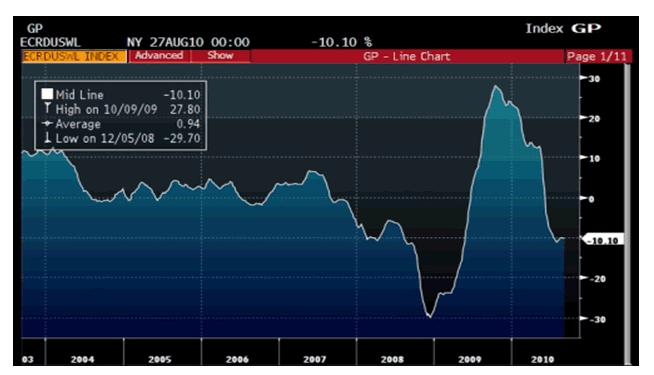
It is rare that human beings admit to having failed. In this, Ben Bernanke is no different than the rest of humanity and although Friedman’s theory failed, do not expect Bernanke to admit it. Bernanke is a one-trick pony. He’s going to try it again.
On August 28th, Bloomberg News reported: Federal Reserve Chairman Ben S. Bernanke said the central bank has the tools to prevent the U.S. economy from slipping back into a recession… Should further action prove necessary, policy options are available.
Note: Milton Friedman, John Maynard Keynes, Alan Greenspan, Ben Bernanke, et. al. share the intellectual failing common to all modern economists, i.e. a collective denial that paper money brings in its own time its own destruction.
THE CASINO OF PAPER MONEY
Capitalism is similar to a giant casino where capital, i.e. paper chips, are issued by the house, i.e. banks, as interest-generating loans. The longer the chips remain in play, the more debt is created which accrues to the house as profit.
Most of those in the casino, i.e. workers, producers and savers, must “invest” their savings with professional gamblers, e.g. investment banks, insurance companies, and pension funds, who arbitrage the odds at various tables and are given additional credit by the house in order to do so.
The professional gamblers offer a small return to the workers, producers and savers and pocket the difference between their winnings and the returns offered; and, as long as the velocity and amount of capital bet increases, the house is profitable and can pay what is owed to the professional gamblers who pay what they owe and keep the rest.
Problems happen when the velocity of capital slows and the aggregate amount bet diminishes. This explains the obsessive concern of the house bookkeepers (central bank economists) regarding the velocity of money and the overall money supply.
After 1900, the velocity of money steadily fell until 1913 when America officially became a casino to be managed by the Federal Reserve, i.e. the house. The house fix, however, was temporary and lasted only 5 years. Note what happened to the velocity of money after 1971 when the casino’s chips are no longer backed by gold.
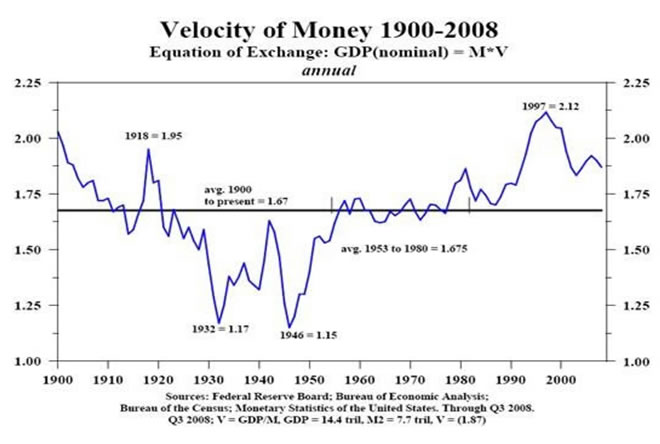
When the historic 1920s US stock market bubble collapsed in 1929, the money supply contracted 25 % by 1933; and, as a consequence, the US made the private ownership of gold illegal that year.
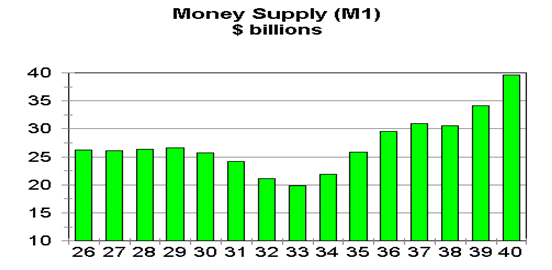
The US confiscation of gold was enforced by the casino to prevent Americans from taking their paper chips off the table to instead buy gold; as gold buying diminishes the overall money supply, i.e. the amount of paper chips in play, and the velocity of capital, i.e. the volume of paper money being bet with the house.
That the US could again confiscate gold is a possibility as America is still operated by the same managers, the Federal Reserve. However, there are differences between the 1930s and today and I discussed this possibility previously on a youtube video, see http://www.youtube.com/user/SchoonWorks#p/u/9/5o36Dj-ukPo.
If the US does outlaw the private ownership of gold, it will erode the ability of Americans to recover after the collapse. The US government, however, is primarily concerned with the ability of the Fed to loan the government money, not the well-being of its citizens. This should be obvious to most Americans. Unfortunately, it isn’t.
Capitalism is similar to a Ponzi-scheme where earnings and winnings must be constantly re-cycled, i.e. “re-invested”, in order to keep the scheme going. This is why the US is so upset with Asian nations with high savings rates—earnings in Asia are not being recycled as quickly as the West requires.
To Asians, savings are a sign of healthy economies and balanced living. To US and Western bankers, high Asian saving rates constitute a “savings glut”, causing the velocity of money and amount bet in the West to slow and threaten its global Ponzi-scheme
This is why China, Japan, Korea, and Middle-Eastern oil-producing nations are pressured to recycle their savings back to the US and/or other Western economies. By so doing, they become captive to the West as their increasingly indebted economies become dependent on the West’s paper driven demand.
In Asia, however, savings are still considered a virtue, not an under-leveraged asset as in the US and Europe. Gold, too, is held in high regard in Asia. Recently, Chinese households have more than doubled the percentage of their savings invested in gold.
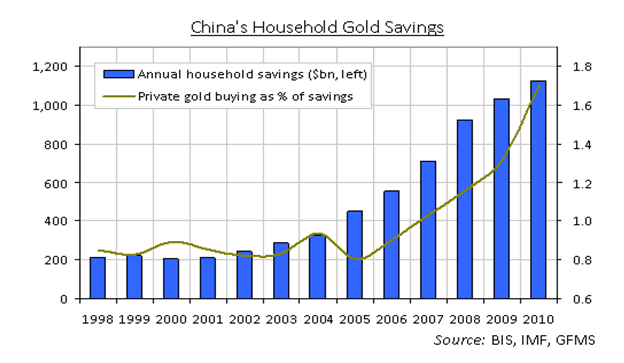
The Chinese are investing in gold because in the 1940s the value of Chinese paper money plummeted 1,000-fold in a hyperinflationary collapse and they remember. Europe, too, suffered extreme monetary distress during the early 20th century, and the Europeans likewise understand that gold is the money of last resort; and, after global markets imploded in 2008, it is understandable why the European demand for gold quadrupled.
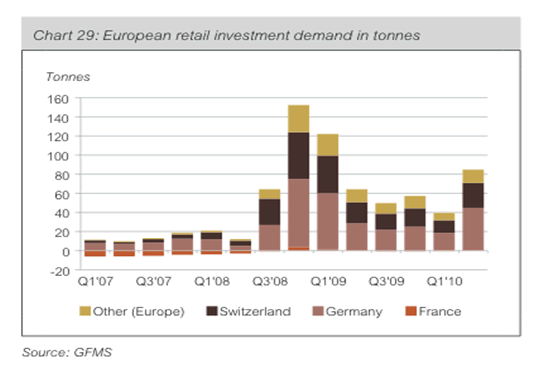
In America, however, the house is committed to keeping America’s savings invested in paper assets and paper promises, i.e. bonds, in order to keep its Ponzi-scheme alive. How long the house, i.e. the Fed, can do so is now the world’s quadrillion dollar question.
The house is now in trouble
Its chips are old and worn
Money’s replaced by IOUs
The management’s looking forlorn
Gamblers are looking elsewhere
For new houses to take their bets
Where payments are made in specie
Not irredeemable debt
Though the wheels of chance are still spinning
And the croupiers are ready to play
It’s rumored the house is bankrupt
And may not last the day
But the barkers are promising jackpots
For all who would still believe
That promises are as good as gold in the hand
And that bankers are better than thieves
THE STAGE IS SET
All the world's a stage,
And all the men and women merely players
William Shakespeare, As You Like It, 1599
In August 2007, I spoke at Professor Antal Fekete’s Gold Standard University Live Session II in Hungary. That month the global credit contraction began, a contraction that one year later was to force stock markets to their knees, triggering such losses that had not governments quickly rescued banks, financial institutions would have closed on a level not seen since the 1930s.
The previous March, I had delivered a paper where I predicted housing would fall 40 to 70 %, stocks would plummet in value and that the world would soon be heading into a economic cataclysm worse than the Great Depression; and not only would demand collapse but a currency crisis would accompany the coming rendering.
I have not changed my mind. Much of what I predicted is still yet to come, although such events are now three years closer to reality. The truth is I had expected such a crisis for decades. Long before it happened, I had a sense that something deeply troubling was awaiting humanity. My sense is that it has now arrived.
Buckminster Fuller foretold such a crisis and others have also predicted the same. Last year, Collapse, a movie featuring Michael Ruppert, author of Crossing the Rubicon and a man much to be admired for his courage in speaking the truth in a time of lies, was released. The trailer for Collapse speaks volumes about what is now happening, see http://www.youtube.com/...
I am a strong believer in destiny. I have seen it in my own life and have no reason to not believe it operates in others’ lives as well. Destiny, however, does not preclude free will. In fact, it includes it.
…there is destiny, all right. The life cycles are in place. It’s just that there are so many alternatives which are unclear.
subject under hypnosis, Journey of Souls, Michael Newton, 1995
I believe this crisis was destined. The writing of my book is evidence of that belief. In the opening chapter are the words:
… there comes a time when neither the hare nor the tortoise is the victor. This is when both the bear and the bull have been vanquished, when the pastures upon which the bull once grazed are long gone and the bear's lair itself lies buried deep beneath the rubble of economic collapse.
This is the time of the vulture, for the vulture feeds neither upon the pastures of the bull nor the stored up wealth of the bear. The vulture feeds instead upon the blind ignorance and denial of the ostrich. The time of the vulture is at hand.
Those words came to me in 1992. At the time, I didn’t know what to make of them. It was, after all, 1992. However, when I began writing about the coming collapse in 2006, I knew then why I had heard those words years before.
Last month I delivered the Sunday talk at the Temple of Universality, a spiritualist church in Tucson. My message contained a fundamental belief that I also have about money, to wit that neither what we call “money” or “reality” are what they appear to be; and that only by understanding the truth about each can we successfully transit the these increasingly dangerous times.
The Way Through, a dvd of my talk at the Temple of Universality, is available at http://www.drschoon.com/media.asp and a video about The Way Through is on youtube at http://www.youtube.com/user/SchoonWorks .
In 1981, Buckminster Fuller described the currently unfolding crisis as “universally-intended”. I believe the crisis is a cosmic regelungen so extreme it will change not only our world it will change humanity as well. That is why we are here.
Buy gold, buy silver, have faith.
By Darryl Robert Schoon
www.survivethecrisis.com
www.drschoon.com
blog www.posdev.net
About Darryl Robert Schoon
In college, I majored in political science with a focus on East Asia (B.A. University of California at Davis, 1966). My in-depth study of economics did not occur until much later.
In the 1990s, I became curious about the Great Depression and in the course of my study, I realized that most of my preconceptions about money and the economy were just that - preconceptions. I, like most others, did not really understand the nature of money and the economy. Now, I have some insights and answers about these critical matters.
In October 2005, Marshall Thurber, a close friend from law school convened The Positive Deviant Network (the PDN), a group of individuals whom Marshall believed to be "out-of-the-box" thinkers and I was asked to join. The PDN became a major catalyst in my writings on economic issues.
When I discovered others in the PDN shared my concerns about the US economy, I began writing down my thoughts. In March 2007 I presented my findings to the Positive Deviant Network in the form of an in-depth 148- page analysis, " How to Survive the Crisis and Prosper In The Process. "
The reception to my presentation, though controversial, generated a significant amount of interest; and in May 2007, "How To Survive The Crisis And Prosper In The Process" was made available at www.survivethecrisis.com and I began writing articles on economic issues.
The interest in the book and my writings has been gratifying. During its first two months, www.survivethecrisis.com was accessed by over 10,000 viewers from 93 countries. Clearly, we had struck a chord and www.drschoon.com , has been created to address this interest.
Darryl R Schoon Archive |
© 2005-2022 http://www.MarketOracle.co.uk - The Market Oracle is a FREE Daily Financial Markets Analysis & Forecasting online publication.



